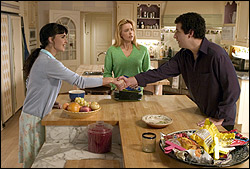Writer-director James L. Brooks (Broadcast News, As Good as It Gets) has a lot of things on his mind in his well-intentioned, wildly uneven Spanglish (which opens Friday, Dec. 17, at the Metro and other theaters): marriage, commitment, the intricacies of raising kids, and the particular culture clash that arises when Latinas work for crazy gringos. Brooks sets it in his backyard, Bel Air, at the sprawling house of laid-back Beverly Hills chef John Clasky (Adam Sandler); his wife, Deborah (Téa Leoni), a blithering neurotic; and their two kids, early adolescent Bernice (Sarah Steele), all braces and puppy fat; and younger brother Georgie (Ian Hyland), a role so underwritten as to be nonexistent. Crucially, there is also Deborah’s gently alcoholic mother, Evelyn, a former jazz singer (Cloris Leachman, who may or may not be doing a dead-on impersonation of Elaine Stritch.)
The New York Times has just called John’s restaurant “perfect, small, passionate” and given it four stars, although he’d have preferred three and one-quarter, to give himself a little headroom. The effect is that he’s now booked four months in advance; and to keep his right hand/maitre d’, he’s had to give him a piece of the business. None of that is as disruptive as his daily struggles to see Deborah through her early midlife crisis, now that her business has dissolved.
Into this pressure cooker comes Flor (Paz Vega), whom Deborah has impulsively hired as a housekeeper although she speaks no English. (Long story.) For translation, Flor turns to her bright 12-year-old daughter, Cristina (Shelbie Bruce), who’s been to school in the states for the six years they’ve lived in the L.A. barrio, “a world apart from the United States.”
Flor is everything Deborah is not: reserved, elegant, observant, and fiercely protective of her daughter. Deborah’s notion of encouraging Bernice (nicknamed Bernie) to lose weight is to buy her bags of clothes one size too small and say, airily, “You can do it, I know you can!”
John is the nurturing one in this marriage, a situation that stuns Flor, teethed on machismo and a husband who abandoned her. Each one is taken by the other’s strangeness.
As the expected triangle develops, the more insidious equation is the tug-of-war for Cristina between Deborah, who virtually adopts her for her bright potential (oblivious to the effect on poor Bernie), and Flor, who sees the danger in Cristina losing her cultural roots, much less herself.
Although you might wonder how John has cooked in kitchens from New York to Beverly Hills without learning a word of Spanish, the restaurant details are solid, and Sandler even seems off-handedly credible in his kitchen. It’s in the creation of Deborah that Brooks, with his lethally great ear, sinks his movie.
We must, finally, give a rap about this self-absorbed ninny, who, at her first sight of lovely preteen Cristina, gasps, “She could make a fortune in surrogate pregnancies!”
It’s hard to keep thinking, “Well meaning, well meaning; stupid but well meaning,” when her first remedy for Flor’s cousin, who has inadvertently walked into a sliding glass door, is ice and two $20 bills, thrust at her like Kleenex. However, when Deborah drifts into an affair out of nothing more than massive self-doubt, then blurts everything to John so they can “talk, talk, talk until we fix things,” it’s nearly literal character assassination on Brooks’ part.
As both families struggle to some kind of resolution, Leoni, taking great gulps of this hazardous role, overacts bravely. Sandler, whose character and restaurant are based on chef Thomas Keller and his stratospherically upscale French Laundry in Napa, Calif., is warm and humane throughout, the ultimate mensch, making us bleed for his predicament. It leaves the day’s honors to the smashing Vega (the Spanish star of Sex and Lucia), whose strength makes Flor’s decency and common sense not just palpable but admirable.
Happily innocent of Hollywood gossip, all I could think of—enduring Spanglish‘s portrait in vitriol of a saintly husband who’s saddled with this mortification of a wife—was, “Big trouble in the Brooks household.” So entirely out of character for a director who has made a career championing forthright women, this is the movie equivalent of Philip Roth’s portrait of his ex-wife Claire Bloom, in I Married a Communist, with perhaps an extra visual turn of the screw. Then I read last week’s New York Times piece on the making of the movie (following Brooks’ recent “ugly divorce”), which has the director pushing poor, game Leoni, “Make her uglier!” As they say, it’s all up there on the screen.








